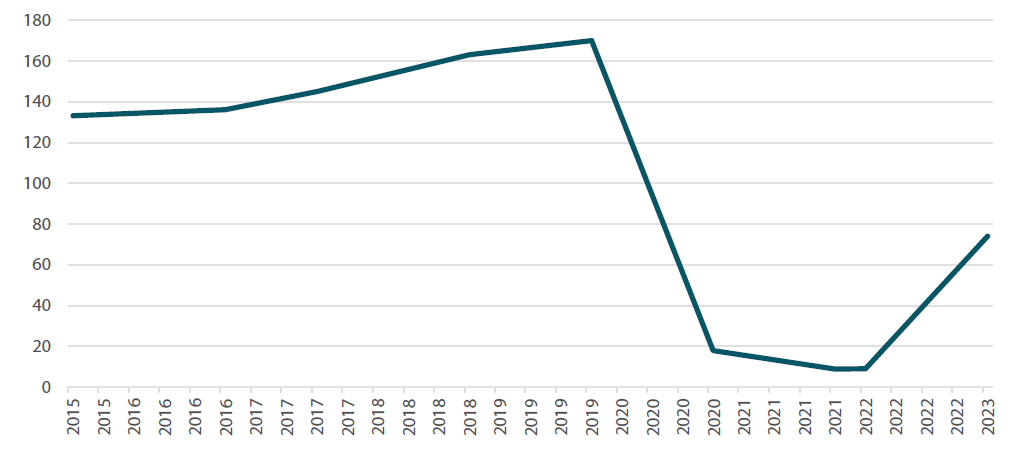Key Takeaways
- International tourism is on track to return to pre-pandemic levels in 2024, driven by the reemergence of the Chinese traveller, a new travel cohort stemming from developing nations and artificial intelligence.
- Constrained supply may not be able to keep up with growing demand, creating pricing power.
- Taking our Future Quality lens to the travel industry, we share some example companies well-positioned to benefit from the positive tailwinds in global travel.
Travel and holidays are important to many people as they represent a break from the norm, a chance to escape mundane reality and experience something exciting and possibly exotic. They are a chance to reconnect with family and friends away from the stresses of daily life and can provide significant benefits for our physical, mental and emotional health.
The forced lockdowns imposed during the pandemic era reinforced the value of holidays for many of us, and in our view there has been a meaningful shift toward experiences that cuts across generations. So much so that in a time when the cost of living has risen dramatically, rather than cutting back on holidays people continue prioritising their importance.
Having normalised significantly during 2023, international tourism is well on track to return to pre-pandemic levels in 20241, underlining why we feel this ongoing Future Quality investment trend is still worth pursuing.
Successful recovery of global travel
For the last couple of years, the global travel industry has been going through the process of normalisation following the pandemic-imposed restrictions that brought worldwide travel to a halt. Planes were grounded, accommodation closed and staff were laid off or siloed; consequently, the sector’s recovery has taken time to rebuild to its former scale.
This normalisation has taken place against a backdrop of strong consumer demand. As lockdown restrictions were lifted, many consumers were eager to rebook holidays that had been either cancelled or postponed. The unleashing of this pent-up demand meant that, according to the UNWTO World Tourism Barometer, international tourism reached 88% of pre-pandemic levels in 20232.
As investors, we were quick to spot the investment opportunity that the normalisation of travel would represent. But now the recovery appears to be almost complete, it is time to reconsider the ongoing strength of this investment theme.
Ongoing growth drivers
Our analysis has determined that there remain several key ongoing drivers of growth for the travel industry. Firstly, while the market expectation that demand has now normalised seems fair, we found that one key factor is largely being ignored: the re-emergence of the Chinese outbound traveller. COVID-19 lockdowns were in place for a lot longer in China than anywhere else in the world and therefore travel restrictions have only just been fully lifted. Given the significant size of the Chinese population, the process of restoring the operational outbound capacity for flights will take time to reach its former scale and demand was initially subdued amid lingering concerns over Covid-19 and tepid economic growth. Yet, the importance of Chinese travellers should not be underestimated. In 2019, they represented the world's largest share of outbound tourists, contributing around USD 250 billion to the global economy3. Signs are positive that Chinese travel will rebound this year with domestic trips over the Chinese Lunar New Year holidays increasing 34% compared with 2023 and marking a 19% rise on 2019 levels4. Travel and tourism have also been highlighted as the best-performing elements of China’s otherwise lacklustre economy.
Chart 1: Number of outbound Chinese tourists (in millions)

Source: Bloomberg, April 2024
Secondly, a new travel cohort is emerging from developing countries—India as a prime example—where rising gross domestic product per capita means more people will be able to afford to travel in the future. While this also includes China, it particularly encompasses the wider Asian region and has resulted in UK airport Heathrow increasing its forecasts of passenger numbers this year due to the growth in Asian routes5.
Finally, artificial intelligence (AI) is being embraced by the travel industry initially to enhance the booking experience for flights, accommodation and car hire, as well as boosting call centre efficiency. However, going forward, AI applications could encompass advertising strategy, marketing content and greater personalisation.
Another factor to consider is supply and demand, given that the demand is clearly there it would be expected that at this stage of the cycle new accommodation would be being developed at an aggressive rate. However, due to concerns around commercial real estate and higher borrowing costs that supply growth is not coming through and is creating further inflationary pressures on overall holiday prices.
Future Quality Finders
Having discussed and reviewed our investment thesis around global travel, we still need to apply our Future Quality lens to find the companies that will attain and sustain rewarding returns not only today but more importantly for tomorrow.
In our view, many quality companies are directly benefitting from the positive tailwinds in global travel, from booking companies to manufacturers of luggage and travel accessories. We currently favour Booking.com, Amadeus and Samsonite.
Focusing on luggage manufacturer Samsonite, having re-engineered its manufacturing footprint and streamlined its costs during the pandemic, we felt its management did a good job of positioning the company for more profitable growth in the future with brand equity and pricing power largely intact. We expect the ongoing recovery in travel, particularly among business travellers, will continue to drive revenue growth and, with a lower fixed cost structure, the business has the opportunity to earn margins somewhat higher than the traditional norm.
By seeing further and envisioning the investment opportunities of tomorrow, we aim to invest in not only what is, but what will be. Contrary to popular perceptions, we anticipate that global travel will endure as a long-haul investment journey that avoids any significant turbulence.
For more information on our global equity investment process, please download Nikko AM’s new investment guide: Seeing Further in Changing Times.
If you have any questions on this report, please contact:
Nikko AM team in Europe
Email: This email address is being protected from spambots. You need JavaScript enabled to view it.
1 https://www.unwto.org/news/international-tourism-to-reach-pre-pandemic-levels-in-2024
2 https://www.unwto.org/news/international-tourism-to-reach-pre-pandemic-levels-in-2024
4https://www.china-briefing.com/news/travel-consumption-data-chinese-new-year-2024-holidays
Any reference to a particular security is purely for illustrative purpose only and does not constitute a recommendation to buy, sell or hold any security. Nor should it be relied upon as financial advice in any way.




